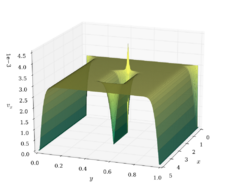Cauchy problem
| Differential equations |
|---|
 |
| Classification |
| Solution |
A Cauchy problem in mathematics asks for the solution of a partial differential equation that satisfies certain conditions that are given on a hypersurface in the domain.[1] A Cauchy problem can be an initial value problem or a boundary value problem (for this case see also Cauchy boundary condition). It is named after Augustin-Louis Cauchy.
Formal statement
For a partial differential equation defined on Rn+1 and a smooth manifold S ⊂ Rn+1 of dimension n (S is called the Cauchy surface), the Cauchy problem consists of finding the unknown functions of the differential equation with respect to the independent variables that satisfies[2] subject to the condition, for some value ,
where are given functions defined on the surface (collectively known as the Cauchy data of the problem). The derivative of order zero means that the function itself is specified.
Cauchy–Kowalevski theorem
The Cauchy–Kowalevski theorem states that If all the functions are analytic in some neighborhood of the point , and if all the functions are analytic in some neighborhood of the point , then the Cauchy problem has a unique analytic solution in some neighborhood of the point .
See also
References
Further reading
- Hille, Einar (1956)[1954]. Some Aspect of Cauchy's Problem Proceedings of 1954 ICM vol III section II (analysis half-hour invited address) p.1 0 9 ~ 1 6.
- Sigeru Mizohata(溝畑 茂 1965). Lectures on Cauchy Problem. Tata Institute of Fundamental Research.
- Sigeru Mizohata (1985).On the Cauchy Problem. Notes and Reports in Mathematics in Science and Engineering. 3. Academic Press, Inc.. ISBN 9781483269061
- Arendt, Wolfgang; Batty, Charles; Hieber, Matthias; Neubrander, Frank (2001), Vector-valued Laplace Transforms and Cauchy Problems, Birkhauser.
External links
de:Anfangswertproblem#Partielle Differentialgleichungen
 |
